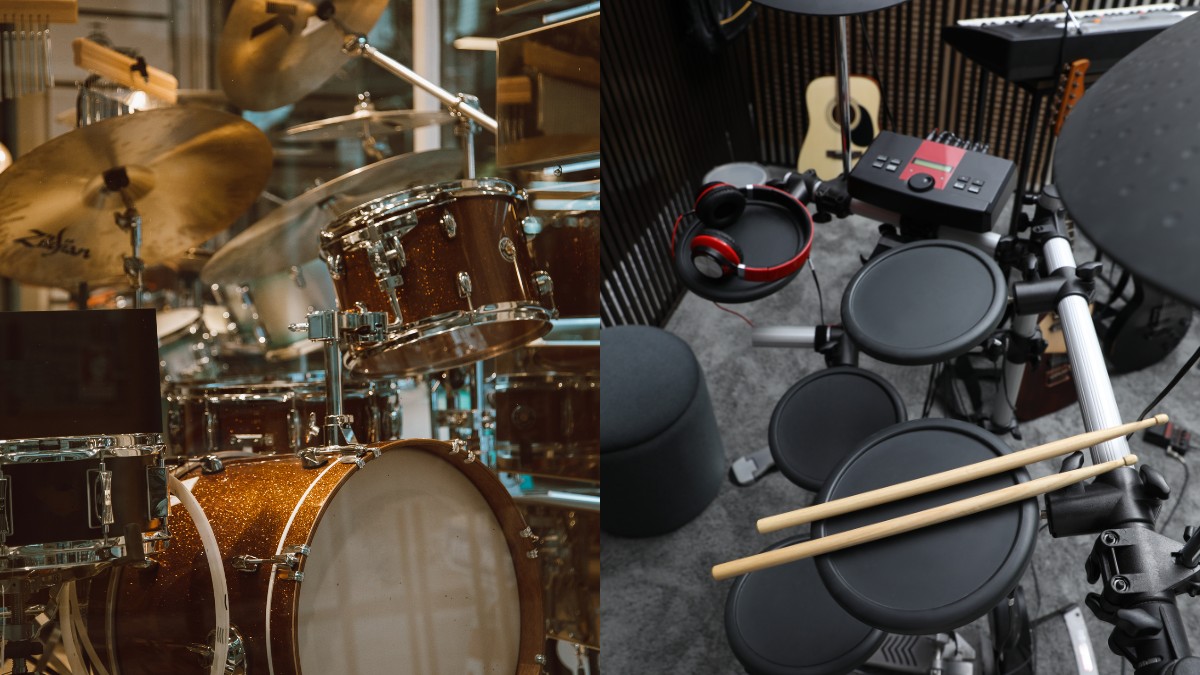10 Tips on How to Become a Session Drummer

A session drummer is a musician who works on a project or contract basis for recording artists, producers, and bandleaders. Being a session drummer requires a wide range of abilities, an open mind, excellent interpersonal skills, and a lot of drive.
Session work can vary from a full-length tour with an artist to laying down the drums for a single track in a studio. Session drummers are self-employed, and pay rates vary based on reputation, production budget, and skill level.
Like any other musician, every drummer dreams of being a rock star and touring with a band while playing big arena concerts.
However, with the advent of remote recordings and home recording technologies, a large volume of work has lured many drummers to focus solely on session recordings.
Contents
You will constantly interact with recording engineers, music producers, and artists. You will also deal with people like managers, promoters, and studio owners who handle music’s record-making process and business aspects.
Just like performance, these are also important facets of the music industry.
I will touch upon some important aspects of session work that will help you break into the business and understand what to expect as you move forward.
At a Glance
- Session drummers need a wide range of skills, including adaptability and professionalism.
- Offer services both in-person and online to reach a broader client base.
- Mastering playing to a click-track is a crucial skill for session drummers.
- Be proficient in various genres and playing styles to increase your versatility.
- Prioritize tasteful playing that serves the song’s artistic vision.
- Always be prepared, reliable, and punctual for recording sessions.
- Maintain self-belief, persevere through criticism, and work towards your goals.
1. In-person & Online Services
Good producers are always on the lookout for new talent. You can contact local studios and inform them about your rates and availability.
Send them a copy of your portfolio and let them know you exist. This isn’t the time to be shy. Even if they do not call you, they might hook you up with another artist or band that needs a drummer.
It never hurts to try. Moreover, the session world is changing with the advent of music production technology.
We’re passionate about music, and our recommendations are genuine. If you buy through links on our site, we may earn a small affiliate commission at no extra cost.
Today, you can work remotely through many platforms like Fiverr, AirGigs, and Soundbetter.
Invest some time/money, get a few drum mics, an audio interface for drums, a DAW for your computer, and set up a home recording studio. Recording your playing, fixing issues, and learning the whole process can improve your skills.
Make your profile and upload your portfolio on these online platforms. Select a competitive rate as you begin so that you can establish a solid reputation before you hike your rates.
2. Be Able to Play to a click-track/Metronome!

Comfortably playing to click-track or metronome is an ESSENTIAL skill for any drummer. This is doubly true for session drummers.
You’ll likely have to sync to a metronome in the recording studio to stay on time. An increasing number of bands also use click tracks on stage, particularly for pop and electronic acts.
If you cannot comfortably play to a metronome, it could lead to embarrassing situations as a session drummer.
For a drummer, there’s no excuse for not being able to play to a metronome. It’s our job to stay on time! If you think this is an area you’re lacking in, get working on it immediately.
3. Know Many Genres and Playing Styles
You should aim to have a well-rounded skill set as a drummer and as a musician as a whole. Knowing how to adapt to different genres may be the key.
Regardless of the path you choose, you should strive to have in-depth knowledge of drumming theory and technique. This includes understanding the nuances of various genres and styles of music, understanding the rhythmic idiosyncrasies of every style you plan to work with (like Pop, Rock, Jazz, Latin, Reggae, etc.), and improvising on demand.
Do you need a Master’s Degree in Music? You’ll unlikely be asked for your education qualifications when applying for session drumming work. Your work can speak for itself and may rarely warrant any institutional stamp unless we go into very specific scenarios.
There are many great drummers with a thorough education, and on the other hand, there are equally respected self-taught drummers who have made it big in the industry.
You may also significantly expand the scope of your work if you are proficient in sight-reading.
4. Play Tastefully
It’s all about drumming tastefully. There’s no need to show off or go overboard; instead, use your heart and the music to take you where you want to go.
The hallmark of a seasoned drummer is how he/she will build the rhythmic foundation of the song with restraint and maturity.
A good session drummer understands and embodies the artistic vision of the songwriter or producer. You’ve already impressed whoever needs to be impressed – that is why you were invited to the studio to lay down a drum track.
A session gig is not the time to flaunt your skills just for the sake of making an impression. Play for the music and do not overshadow the artist.
5. Be Very Prepared

In the recording studio, every minute costs money. That means no playing around and coming prepared to do your job. You don’t want to invoke the producer’s wrath because you forgot a drum key or a pair of drumsticks.
If you waste their time, things won’t end well. Prepare a toolkit and backpack with everything that you need, and always carry it with you.
Keep spare drum heads, snare wires, a well-populated stick bag, and other paraphernalia that can disrupt a session and waste time.
Furthermore, you should be reliable and always turn up on time. Try to reach the studio early, grab a coffee, and get a feel for the gig by soaking in the vibe.
6. Advertise Yourself
You could groove flawlessly like Peart or Portnoy in your basement, but it is very little for your career if nobody else can appreciate it.
Social media and self-promotion will play a big role in your reach, and you need that reach to establish a steady fan base or make a portfolio of videos that highlight your skills as a drummer.
When like-minded artists discover your work, it can become your ticket to the studio or a big audition.
Nevertheless, not every session gig has an audition. If you want consistent work, you need to expand your circle of influence and spend some time on self-promotion, especially at the very beginning of your career.
Make some high-quality videos that demonstrate your drumming skills and upload them on social media platforms. Complement this with networking; it is crucial to obtain new clients and make inroads into studio drumming for high-paying film or commercial projects.
7. Leave Your Ego At the Door
Be kind and respectful. Leave your ego at the door. Don’t burn bridges and risk the position that you’re in.
Being a good session drummer is not just about having great technique and wicked chops. If people don’t like you, you won’t be asked back for jobs.
They must feel you understand their aesthetic vision and can convey it convincingly. Many famous songwriters or producers will echo this sentiment – that a personal connection and the ability to understand the musical context are as important as the right skills.
So what can you do? First, speak to the artist/producer and understand their needs. Ask for reference tracks or listen to their previous music.
Ask them to send you the pilot track (without drums) if they have it, and spend some time taking notes. Jam to the track and build upon the grooves and motifs that you like. This will save valuable time in the studio. It will also establish you as a diligent drummer with a DIY ethos whom producers and artists can rely upon.
8. Performance and Improvisation

As a groove merchant, you will work in many studios, genres, and styles. You will also work with many different personalities. Adaptability is key.
You should also be able to take an artist’s (often vague) instructions and deliver something tasty and tangible. In many live scenarios, you need to improvise during a solo section or outro or may even have to ‘wing’ the entire song. You are expected to sit in and get it right in the first few takes in the studio.
Session gigs can be subjective and unpredictable, so you must learn to adapt to the stress and pressure of every situation. An easygoing attitude and a flexible playing style will lead to more work.
However, it is acceptable to pursue a ‘pet genre’ and then advertise yourself as an expert in it, i.e., a go-to funk drummer or a go-to jazz drummer. But remember that this will significantly narrow the work you are eligible for.
9. Have Self-Belief
Don’t wallow over the criticism and rejections. You need to hang in there and be in it for the long haul. Nobody wants a quitter or someone who can’t hang in there.
This might sound like some generic advice, but it’s incredibly important. When going after professional work in the music industry, you will likely be turned down a lot. Depending on where you are based, you might also need to work for a very low wage or do a lot of free gigs before you get paid anything worthwhile.
To get any experience, you need to be able to see these as opportunities. The result of these should be a good set of videos, tracks, and photos that you can use to promote yourself.
People might be rude, particularly early on. You need to try your best to get through it. When approaching people with your self-belief, you need to strike a good balance between being approachable and publicizing your skills while not coming across as somebody with a big ego.
10. Know Your Goals
It’s much easier to get somewhere when you know where you’re going. Set clear goals and work towards them.
What are your goals for being a session drummer? Do you want to do it as your main career? Is it a side income? Or will it simply be a hobby or passion project while you hold down a job?
What artists do you want to perform with? Do you want to play on big albums, or do you want to play to large crowds?
Early on in your session drumming career, you should use your goals as a vision to keep going, keep enthusiasm, and remember why you’re doing this in the first place.
If you lose the passion for session drumming, then think back to your goals. Perhaps the genres you’re working with no longer excite you like they used to. Perhaps the lifestyle of a session drummer is not as suited to you as you thought. Or maybe… you haven’t been stuck in there for long enough to see the true potential in your session drumming career.
Keep that in mind. And when you’re doing it, go back to your goals, go back to your vision, remember why you started in the first place, and make sure you stay true to it.
Summary
Keep a humble attitude and grow a thick skin. It is no trade secret that many creative artists can be self-centered or temperamental. You need to deal with all sorts of impatience or abstraction, and there will be moments when someone will be disrespectful in their criticism. It is rarely personal.
Treat it as constructive criticism and do your best to adjust because any unwarranted attitude or ego can tarnish your reputation.
Playing session gigs is a great way to challenge yourself and grow as a drummer constantly. You can continue to do it alongside your individual goals or while playing with your band. It is a lucrative field that can be financially rewarding once you move past the initial struggle.








No 11 – Whether it’s the studio or live performance that turns you on, learn to read scores at sight.
For years I tried to kid myself that reading wasn’t necessary. I am now 75 and have played since I was 10. And maybe it wasn’t so important playing pop and rock in the 60s and 70s. But turning up to a ‘jazz’ session in my late 30’s and finding it was fully arranged ‘Chicago’ style 8 piece being recorded was one of the more embarrassing sessions of my life. It was just assumed I would be able read & play the rests and repeats and dynamics – and I couldn’t. I started to learn to read that week and haven’t stopped since.
We can’t all play like Bernie Dresel or Vinnie Colaiuta or Joe Morello but I would dearly have loved to read like them.